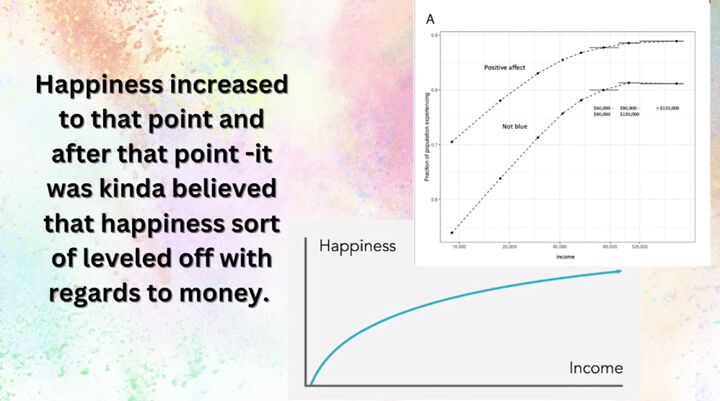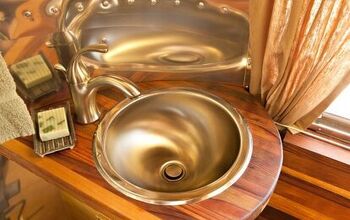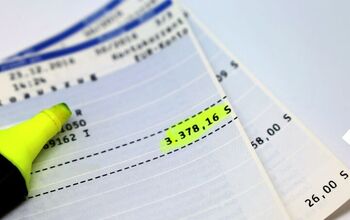Can Money Buy Happiness? Here's How Research Says It Can

Today, we’re asking “Can money buy happiness?” The answer is surprising. Let’s look at what the research says and how to spend our money to increase our happiness.
What the research says
You might be familiar with the study by economist and psychologist Dr. Daniel Kahneman, back in 2010, that pegged peak money happiness to an income of around $75,000. Happiness increased to that point and then, it was believed, it leveled off with regard to money.
Recently they revisited this study. The results were quite different. Rather than tapering off, the researchers saw happiness and income pretty much increasing lock-and-step all the way to $200,000 (possibly beyond).
In a separate study, levels of well-being continued to increase beyond a $600,000 annual income. Notably, day-to-day happiness didn’t seem to increase beyond $400,000 a year. Rather, the perception of life satisfaction increased.
Attitude is key
In this newly revisited study, 15% to 20% of the 33,000 respondents, saw a leveling off of happiness around an income of $100,000. That’s similar to the $75,000 mark in the 2010 study since $100,000 today is equivalent to $75,000 thirteen years ago.
Upon analysis, researchers found this leveling off was more telling about people’s personalities. Some people are happier than others from a medical stance (money doesn’t alleviate clinical depression) or because some have sunnier dispositions.
I’m a huge believer in attitude being everything. I wasn’t born with this attitude. I had a brain tumor that left me with epilepsy. I was depressed for a long time until I realized my attitude was within my control, while other factors were not. I worked on it and can honestly say life is better with a positive attitude.
Can money buy happiness?
Money being correlated with happiness isn’t really surprising. The reason is twofold. Lack of money can lead to stress and unhappiness.
On the flip side, greater income creates greater possibilities. When you go from a low income to a moderate income, you’ll see a great increase in happiness. You can afford the basic necessities.
It’s difficult to be happy if every day is full of struggles. In a sense, money buying happiness really means money increasing comfort or alleviating pain. Being able to put food on the table for your family goes a long way toward happiness.
When you go from a moderate to a high income, it can continue to create happiness because of the opportunities. Fundamentally, money gives you control of your life. That accounted for 74% of the associations between income and well-being. The more control and influence on your life you feel you have, the easier it is to be happy.
Buy experiences
To “buy happiness”, science says you should spend on experiences with others or experiences that create memories. This provides more happiness than spending on things because the happiness from experiences comes three times: the anticipation of the experience, the experience itself, and the memories.
Whereas, when you buy a product it’s exciting once, but over time the happiness goes away. The caveat here is products that allow you to have more experiences, for instance buying golf clubs that allow you to go golfing regularly, gives you the same happiness increase.
Buy time
One way to “buy happiness” with money is to buy back your time. We look forward to weekends when we have the greatest control of our time, to sleep in, spend time with friends and family, or do activities we enjoy.
But, life often gives us tasks we don’t want in our free time that decrease happiness. If you find ways to farm out these tasks and buy back your time that can boost happiness. Think of hiring someone to cut the lawn, clean, or deliver groceries.
Keeping time in mind is hugely important when it comes to money and happiness, because at times, in an effort to increase income, people will work longer hours. If you work too much, you might notice your happiness decline.
Doing things for people you care about and watching them experience a happiness boost will boost your happiness as you live vicariously through them.
Set goals
Spending on challenges and goals goes a long way to having a joyous life. Maybe you want to learn a new sport or become fluent in Spanish, take a trip to Spain, and converse with the locals.
For any goal that piques your interest, spending money goes a long way to boosting happiness. There’s something to be said for a life of continual learning. Don’t be afraid to spend when you want to learn new things, because if you care about it, it will absolutely lead to greater satisfaction.
Live within your means
It makes sense that as income increases, so does happiness. That income increase helps you buy nicer things and elevate your lifestyle. There’s absolutely nothing wrong with that as long as you still live within your means, stick to a financial plan, and build a brighter financial future.
If you buy too big a house relative to your income, you’re not going to be happy. You’re going to be stressed. Same with a vehicle. Living outside your means is a recipe for unhappiness, and it’s possible to do this at any income level.
The greater freedom you feel you have with your discretionary income, the greater happiness you feel. If you feel you have no discretionary income, regardless of income level, it’s easy to feel like a prisoner in your own life.
It’s important to know how much you need and how much is enough.
Let’s say you retire with a million-dollar portfolio, how much would your happiness increase if your portfolio jumped to two million? Quite a bit. According to the rule of 4%, you doubled your annual income.
But, how much would your happiness increase if your eight million dollar portfolio jumped to nine million? Likely not as much. Your efforts are better directed where they have the most impact, rather than on the margins.
Before committing to longer hours and more years of working, look at it from the perspective of maximizing your happiness. Living your happiest life is a worthy goal. Using your income to buy happiness? That’s smart spending.
Can money buy happiness?
Can money buy happiness? What do you do to increase your happiness? Let me know in the comments.





























Comments
Join the conversation
You know how much you need? 25% more than what you actually have - LOL! We have lived at all different levels of income and have found that when we made more, we spent more - more expensive car, wanted to move up to a larger home, bought more expensive clothes, ate out more - and still did not save a higher percentage of our income.